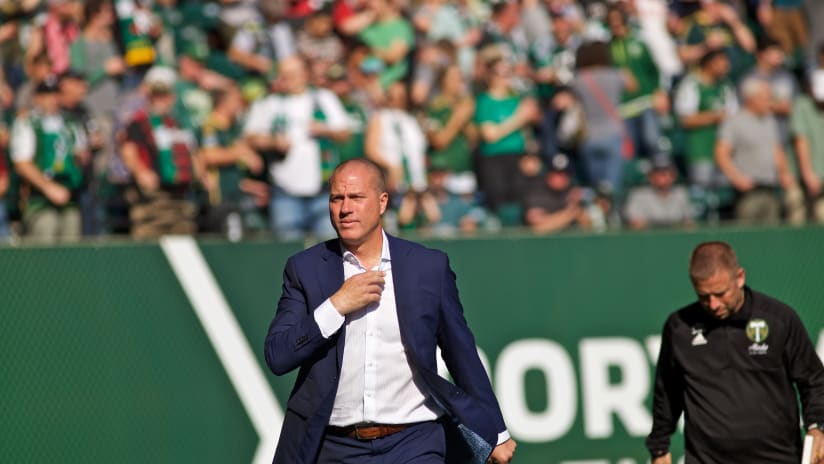PORTLAND, Ore. – The nature of sports leagues lend themselves to parallels.
You play the game on a regular basis, by the same rules, and over the span of players’ careers, they often compete against the same opponents. The teams in leagues may change, as do the cities and venues, but only slightly. Over the course of a player’s career, those largely stay the same, too. Even the schedules, designed to balance the practical and competitive, leave people saying, “It feels like we’ve been here before.”
Such will be the case Sunday at BC Place in Vancouver, British Columbia in the MLS Decision Day presented by AT&T match (1:30pm PT, ROOT SPORTS). For the third year in a row, the Timbers will close their season against Whitecaps FC. Two years ago, the trip north ended in sadness, with Portland enduring one of the the most painful losses in the club’s Major League Soccer history. Last year, though, with their Cascadian rivals venturing south, Portland’s victory cemented the top seed in the Western Conference for the Audi 2017 MLS Cup Playoffs.
This year, the parallels go beyond the opponent, the timing, or the stakes entailed in a regular season’s final match. For the second time this year, a meeting with the Whitecaps portends a week of congestion, one the Timbers faltered in before. Now, looking back on the three-game, three-loss stretch the team began with Aug. 11’s home loss to the Whitecaps, Timbers’ head coach Giovanni Savarese is philosophical.
“We learned a lot during that time,” Savarese said on Wednesday, during his weekly press conference, believing his team is, now, “facing [the coming] games in a different way.”
So how did the Timbers face those games before? Those are specifics Savarese has never shared, but in the wake of that Saturday loss to Vancouver – the Timbers’ first in 16 games, at the time – the lineups for the ensuing matches were telling. For that Wednesday’s game at Audi Field in Washington, D.C., nine of 11 starters were retained. The Timbers lost, 4-1. Three days later, seven players who started in D.C. were in the starting XI at Sporting Kansas City. The Timbers lost, 3-0.
Ahead of Sunday’s match in Vancouver, the Timbers face a similar stretch, if all goes well. On Saturday, the team will travel to British Columbia and return Sunday night. There is the possibility of staying home for a Wednesday or Thursday Knockout Round game, but it’s slightly more likely the team will have to travel, potentially as far away as Dallas. Should Portland prevail in the knockout, they’ll return home the next day to prepare for a weekend, Western Conference Semifinal opener of a two-legged series. At least that one would be at Providence Park.
That makes the lessons from mid-August’s stretch more important. Audi Field and Children’s Mercy Park have proven to be two of the toughest venues to play at this season. D.C. United and Sporting have combined for a 22-4-7 record at home, this season, so it is unclear the Timbers would have taken points had they handled that week differently. But within that week, Savarese essentially engaged an opportunity cost. The potential for points from one approach, he now hints, was pitted against the potential for knowledge for the other.
“You get to see what your team is made of, and what is possible from your team in those scenarios,” Savarese said, while still insisting, “We always go to every field to win.” Still, “it allows you to be able to understand many things, because not every team can [face] that scenario in the same way..”
Savarese is in his first year in Portland – in his first year managing the Timbers’ squad. By the end of his fifth year with the New York Cosmos, he undoubtedly had an intimate knowledge of what his players could and could not do. The questions he’d ask of players in terms of tasks, tactics and performance? He knew how they would answer.
This is Savarese’s first season asking questions of Diego Chara. He’d managed Diego Valeri since late January, but he’d never asked the reigning MLS Most Valuable Player to push himself like he did during that week in mid-August. How would Samuel Armenteros, Julio Cascante, Larrys Mabiala and Zarek Valentin respond?
Savarese didn’t know. But his team faced two more three-game weeks later on their schedule. And, come the postseason, the prospect of a short, mid-week turnaround following the regular season’s finale loomed, as well as a potential first leg of the conference semifinal two or three days later.
Perhaps the frustration of a record-snapping loss played a part, but ultimately, Savarese needed to know his players’ limits. And, over the Timbers’ worst week of the season, he found out.
“Sometimes, you test to learn,” he reveals, now. “You don’t test certain things, you never know how things will react.”
The Timbers got a reaction in mid-August. They also got information – potentially, a wealth of it.
How that information is applied over the next 10 days may determine how far Portland goes in the 2018 postseason. They’ve started this gauntlet with Vancouver, before.












